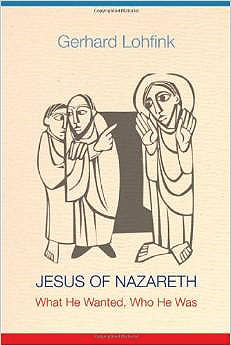In a new book entitled “Jesus of Nazareth,” famed German Scripture-scholar Gerhard Lohfink describes how people in the Gospels related to Jesus in different ways.
Not everyone was an apostle, not everyone was a disciple, and not everyone who contributed to Jesus' cause even followed him. Different individuals had their own way of connecting to Jesus. Here's how Lohfink puts it:
"We may say that the Gospels, especially Mark, are aware of a great variety of forms of participation in Jesus' cause. There were the Twelve. There was a broader circle of disciples. There were those who participated in Jesus' life. There were localized, resident adherents who made their houses available.
There were people who helped in particular situations, if only by offering a cup of water. Finally, there were the beneficiaries who profited from Jesus' cause and for that reason did not speak against it."
Lohfink then makes this observation: "These structural lines that run through the Gospels are not accidental.... In today's church, because it is a shapeless mass, we can find all these forms expressed. It is a complex pattern, as complex as the human body. The openness of the Gospels, the openness of Jesus must warn us against regarding people as lacking in faith if they are unable to adopt a disciple's way of life or if it is something completely alien to them. In any event, Jesus never did."
If what Lohfink says is true, this has implications as to how we should understand the Church, both as it is conceived in the abstract and how it is understood practically within our parish structures. Simply put, the similarity to Jesus' time is obvious.
When we look at Church life today, especially as we see it lived out concretely within parishes, it is obvious that it is made up of much more than only the core, committed congregation, namely, those who participate regularly in church life and accept (at least for the main part) the dogmatic and moral teachings their churches.
The Church also contains a wide variety of the less-engaged: people who practice occasionally, people who accept some of its teachings, guests who visit our churches, people who don't explicitly commit but are sympathetic to the Church and offer it various kinds of support, and, not least, people who link themselves to God in more-privatized ways, those who are spiritual but not religious. As Lohfink points out, these people were already around Jesus and "they were not unimportant" to his mission.
But we must be careful in how we understand this. This does not mean that there are tiers within discipleship, where some are called to a higher holiness and others to a lower one, as if the full Gospel applies only to some.
There were some centuries in church history where Christian spirituality suffered from exactly this misunderstanding, where it was common to think that monks, nuns, contemplatives, priests and other such people were called to live the full Gospel while others were exempt from the more-demanding of Jesus' invitations. No such exemptions. The Church may never be divided into the perfect and less-perfect, the better and the half-baked, full-participation and partial-participation. The full Gospel applies to everyone, as does Jesus' invitation to intimacy with him. Jesus doesn't call people according to more or less.
Christian discipleship doesn't ideally admit of levels, notches, layers and different tiers of participation — but something akin to this does forever happen, analogous to what happens in a love relationship. Each individual chooses how deep he or she will go, and some go deeper than others, though ideally everyone is meant to go its full depth.
And, given human history and human freedom, this is not surprising. There will always be a great variation in both depth and participation. Each of us has his or her own history of being graced and wounded, formed and deformed, and so we all come to adulthood with very different capacities to see, understand, love, accept love and give ourselves over to someone or something beyond us. None of us is whole and none of us is fully mature. All of us are limited in what we can do.
Hence, religiously, nobody can be expected to respond to something that is completely outside of his or her sphere of possibility. And so we will inevitably gather around Jesus in very different ways, depending upon our capacity to see and to give ourselves over. Jesus, it seemed, was okay with that.
In his view, there was no such a category as a Cafeteria-disciple or a Disciple-light. There shouldn't be such categories, either, in our understanding. We are all around Jesus in our different ways and we must be careful not to judge each other, given that Donatism and her adopted children are forever on the prowl.
Oblate of Mary Immaculate Father Ronald Rolheiser is a specialist in the field of spirituality and systematic theology. His website is www.ronrolheiser.com.

